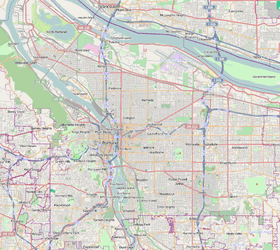Uroboros (sculpture)
|
The sculpture in 2015 | |
 Uroboros Location in Portland, Oregon | |
| Artist | Charles Kibby |
|---|---|
| Year | 1979 |
| Type | Sculpture |
| Medium | Cast concrete |
| Subject | Uroboros |
| Location | Portland, Oregon, United States |
| 45°28′09″N 122°38′31″W / 45.469041°N 122.641843°WCoordinates: 45°28′09″N 122°38′31″W / 45.469041°N 122.641843°W | |
| Owner | City of Portland and Multnomah County Public Art Collection courtesy of the Regional Arts & Culture Council |
Uroboros is an outdoor 1979 sculpture by Charles Kibby, located at Westmoreland Park in the Sellwood neighborhood of southeast Portland, Oregon.[1] It is a modern depiction of the uroboros, an ancient Egyptian and Greek symbol depicting a serpent or dragon eating its own tail.
Description and history
According to the Regional Arts & Culture Council, which administers the work, the cast concrete sculpture measures 48 inches (120 cm) x 14 inches (36 cm) x 72 inches (180 cm) and rests on a base that measures 24 inches (61 cm) x 20 inches (51 cm) x 20 inches (51 cm). The organization lists "MAC 1979–80" as the funding source.[2] However, the Smithsonian Institution lists the sculpture's measurements as 45 inches (110 cm) x 45 inches (110 cm) x 16 inches (41 cm), on a base that measures approximately 21 inches (53 cm) x 20 inches (51 cm) x 16 inches (41 cm). The Smithsonian categorizes Uroboros as abstract ("geometric") and notes that it was commissioned by the Comprehensive Employment and Training Act (CETA) before being donated to the park.[3]
The sculpture is part of the City of Portland and Multnomah County Public Art Collection courtesy of the Regional Arts & Culture Council.[2][4]
See also
References
- ↑ "Westmoreland Park". Portland Parks & Recreation. Retrieved November 3, 2014.
- 1 2 "Public Art Search: Uroboros". Regional Arts & Culture Council. Retrieved November 3, 2014.
- ↑ "Uroboros, (sculpture).". Smithsonian Institution. Retrieved November 3, 2014.
- ↑ "Uroboros, 1979". cultureNOW. Retrieved November 3, 2014.
External links
- Uroboros at the Public Art Archive